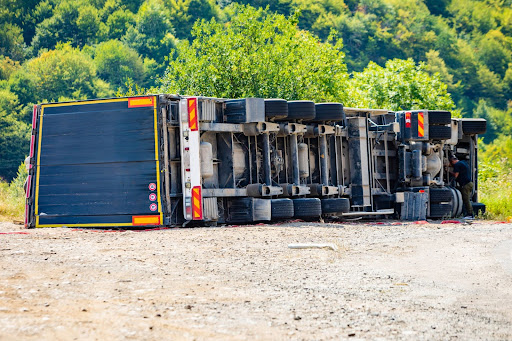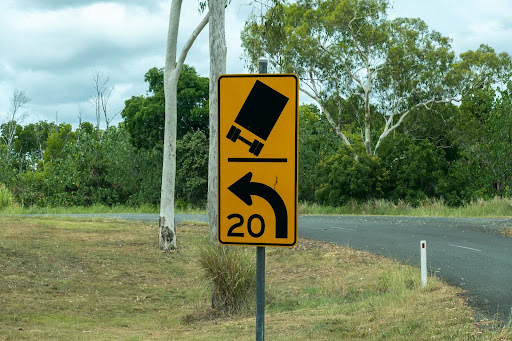Rollover accidents are always dangerous but can be deadly when a tractor-trailer is involved. The high center of gravity on these tall vehicles makes them prone to rolling over if the driver must swerve or brake unexpectedly. If you are in a passenger car next to the truck, you could be crushed or pushed into other vehicles if the big rig rolls onto you.
If you have suffered injuries in this kind of crash, you need legal representation from a top-notch St. Louis truck rollover accident lawyer. At Langdon & Emison, we specialize in handling cases like yours with experience and compassion. Contact us and schedule a free consultation to learn more about your options for financial recovery from those responsible for your crash.

What is a rollover truck accident?
Rollover accidents are violent and frightening. They happen when a vehicle flips over, either landing on its side or roof or flipping over multiple times. The driver and their passengers are shaken about the interior of the vehicle, hitting their head on the side of the window, being jolted into the dashboard, or even being partially or fully ejected from the vehicle.
The science behind a truck rollover accident
Rollover commercial truck accidents involve a certain set of circumstances where the vehicle’s higher center of gravity and the size of its track width (distance between left and right wheels) affects its stability. The higher the center of gravity and narrower the track width, the less stable it is.
A truck’s center of gravity is the point on the truck where its weight is even on both sides. The shape and design of a cargo or semi-truck and the location of its cargo, and the cargo weight, make it harder to determine a fixed center of gravity. If the cargo isn’t secure, it can shift in transit, which alters the truck’s center of gravity.
Instability is a significant contributor to rollover accidents. If a truck goes around a corner, travels too fast, or is subject to high winds, then there’s a greater chance of a rollover.
These accidents sound serious – and they are.
If a truck rolls over, there’s a good chance it collides with other vehicles on the road leading to a devastating multi-car accident. You may not have been in the vehicle rolling over, but that doesn’t mean you can’t be injured in a serious rollover accident.
Truck rollover statistics
Commercial truck rollover accidents are counted as some of the most fatal. They occur on highways or freeways where all vehicles travel at high speeds. Higher rates of speed mean that when vehicles collide, there’s more deadly force transferred from the vehicles to the people inside.
The Federal Motor Carrier Safety Administration’s (FMCSA) Large Truck Crash Causation Study noted several alarming statistics in a recent report to Congress:
- Rollover accidents only comprise about 4-5% of all fatal trucking accidents
- More than half of all truck rollovers happen on divided highways – 56%; 42% happen on 2-lane, non-divided roads
- 70% of truck rollovers involve a Class 8 tractor-trailer or a “bobtail,” which is a rig without the trailer attached
- Nearly half of commercial truck accidents in which a truck occupant dies (47%) happen in rollover accidents
Dangers of rollover accidents
The danger of a rolling vehicle hitting another car on the road is high. If this occurs on a highway when vehicles merge onto the road or exit, the chances for a multi-car accident increase.
Rolling a vehicle means that the occupants may not have the same protections as they would if the vehicle is hit in another manner. Newer vehicles are equipped with airbags, front and side, and “crumple zones,” designed to absorb much of the impact and crumble, which means the impact has less force on the people inside.
These protections aren’t on the roof of a car or semi. So, when one flips, there’s nothing between them and the ground or another vehicle except a thin sheet of metal. In addition, the chances of being ejected from the vehicle are higher in a rollover accident than in other types of wrecks.
Rollover accidents often cause catastrophic injuries, including the following.
Head and brain injuries
including traumatic brain injuries, can be severe enough to cause permanent brain damage and personality changes.
Internal injuries
These include injuries like a punctured lung or a ruptured spleen. The resulting internal bleeding can cause dangerous sepsis.
Spinal cord damage
Spinal cord damage can cause partial or total paralysis, require surgery, or result in a lifetime of chronic pain and compromised movement.
Amputation
Amputation can occur due to a severe crushing injury of the hands, feet, or limbs.
Broken bones
Rollovers often cause multiple fractures. You may require surgery or extensive physical therapy to regain your ability to walk or use your arms.
Death
According to the Insurance Institute for Highway Safety, more than 5,600 drivers and passengers died in rollover accidents in 2021. Over 2/3 of people who died in a rollover accident weren’t wearing seatbelts at the time.
When and where do most rollover accidents occur?
These scenarios are the most likely to lead to a rollover accident:
Flip over when a vehicle strikes an object and rolls over sideways.
Trip over, when a vehicle suddenly slows or stops and goes nose-over-tail.
Turned over when a vehicle goes around a sharp turn and flips due to centrifugal force.
Bounce over, rebounding off other objects like a guardrail before it overturns.
Fall over, when a top-heavy vehicle going down a steep slope flips over.
According to the Missouri State Highway Patrol, in 2022 there were 479 commercial vehicle overturn accidents in Missouri. The FMCSA notes that speed is a large factor in rollover
Common causes of rollover truck accidents in St. Louis
There are many reasons a truck could roll over and cause an accident. Because they are so much larger and heavier than other vehicles, they are harder to control on slick or uneven roads. They also have a wider turning radius and must have adequate room since unbalanced freight in the trailer could cause it to tip over in a tight turn.
According to the Federal Motor Carrier Safety Administration (FMCSA), most rollover crashes result from some driver error. They may have committed any of several mistakes, including:
- Speeding, especially in inclement weather
- Distracted driving
- Failing to observe traffic laws and signs
- Underestimating the right response to a sudden event
- Not paying adequate attention to other vehicles around them
- Driving while fatigued
- Driving under the influence of drugs or alcohol
- Failing to observe regulations regarding rest breaks
- Incorrectly handling a tanker truck, leading to the “slosh factor”
In addition to driver error, rollover accidents can result from mechanical failure on the truck or trailer. This means inspectors, manufacturers, and repair shops could be held liable for your crash.
Our St. Louis truck rollover accident lawyers are ready to help
We are ready to listen to your story and fight for you against big trucking companies and insurance providers who want to protect their profits. We push back against their underhanded tactics to secure the compensation you need to pay for all your related expenses: past, present, and future.
Contact us to schedule a free consultation with an accomplished St. Louis truck rollover accident attorney today by calling us at (866) 931-2115 or using our convenient online form.




